Drug reform hasn't been much of an issue in the presidential campaign, but there are differences between the major party candidates -- and much larger differences between them and a trio of minor party candidates with solidly radical drug reform proposals. For whom to vote?
In 2002, the Office of National Drug Control Policy set goals of reducing marijuana and overall drug use. Despite artful manipulation of the numbers, ONDCP has failed at its stated goal, but it has managed to drive into treatment thousands of pot smokers who didn't need it.
"Dying to Get High," by sociologists Wendy Chapkis and Richard Webb, is a groundbreaking work that provides an in-depth portrait of one of the country's most well-known medical marijuana collectives.
A Wyoming cop gets sentenced for stealing his canine officer father's training dope, a prosecutor in Indiana is in the hot seat over asset forfeiture, and another prison guard gets busted.
Spurred by YouTube videos and reports of increasing use, a bill that would ban salvia divinorum has passed the Massachusetts House of Representatives.
A decade ago, Washington voters approved a medical marijuana law. Now, the state Department of Health has set quantity limits.
A cocaine shortage is leading to a wave of killings in Cincinnati. Local officials are close to making the link between prohibition and the violence, but they're not there yet.
Relations between the US and Bolivia continue to worsen. Late last week, Bolivia barred DEA surveillance planes from overflying the country, and on Saturday, President Morales scorned US anti-drug policy.
Peruvian government efforts to crack down on coca growers in some parts of the country are causing them to expand into indigenous regions in the central Peruvian jungle. Local residents are not pleased.
In two separate cases, Malaysian courts have sentenced three men to death for trafficking less than two pounds of marijuana. Meanwhile, executions of drug offenders continue apace in the Middle East.
Judges in the Netherlands narrowly favor legalizing marijuana, according to a new poll.
Drug testing violates personal privacy. Now, at least one widely-used drug testing kit has been proven to be a scam too.
Events and quotes of note from this week's drug policy events of years past.
With the presidential election now less than a month away, Democratic candidate Barack Obama appears poised for victory, according to the most recent polls, though the race is far from over. From the beginning of the campaign, drug reform and drug policy have barely registered in the discourse, a state of affairs that has grown even more pronounced as the country slips into economic crisis and the news media focuses obsessively on the two major party candidates, their campaigns, and their responses to the crisis.
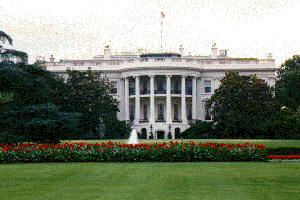
The White House
Despite the silence at the presidential level, there is an emerging consensus in the country that the war on drugs is a failure --
76% of respondents in a Zogby poll last week said so -- and there are several presidential candidates whose drug policy platforms actually appeal to drug reformers. With one major party candidate or another establishing clear leads in most states, the presidential election will be decided in a handful of battleground states, and that means drug reformers in the remaining states have the option of voting for candidates whose views resemble their own without jeopardizing the chances of their favored major party candidate.
When it comes to the basic underpinnings of US drug policy, Sens. McCain and Obama are similar, and non-reformist. When it comes to some important details, however, differences do appear. The similarities are well demonstrated by the candidates' responses to a questionnaire from the International Association of Police Chiefs about their views on drug policy, among other issues. The question and their responses are worth reading in their entirety:
"Narcotics abuse and trafficking continues to be a problem that state, local, and tribal law enforcement officers face every day. How would you ensure that enforcement, prevention, and treatment programs receive equal resources and assistance to combat this growing problem?" asked the police chiefs.
Here is McCain's response:
"Illegal narcotics are a scourge that I have fought against for my entire legislative career, and I believe this fight must begin with prevention and enforcement. That is why I introduced the Anti Drug Abuse Act of 1988 during my first term in the Senate and supported the Drug Free Borders Act of 1999, which authorized over $1 billion in funds to bolster our ability to prevent drugs from flowing through our borders and ports by improving technology and expanding our interdiction forces. As president, I would continue these efforts to ensure that our nation's children are protected from the influence of illegal drugs and that the drug peddlers are brought to justice for their crimes.
We must also realize that treatment is an important element of the mission to eradicate drug abuse. I supported the Second Chance Act, which authorized up to $360 million for violator reentry programs in 2009 and 2010. Last year, approximately 750,000 inmates were released from custody and returned to our communities, and typically one half will return to incarceration. The Second Chance Act funds programs that prepare prisoners for the transition from prison to society by providing job training, mentors, counseling, and more. Some programs report reducing recidivism rates by 50 percent. These programs could save American taxpayers hundreds of millions of dollars. On average, the annual cost of incarcerating a prisoner exceeds $20,000 -- a number that increased sixfold between 1982 and 2002. As president, I believe we should support having parents with children in the home rather than in prison, former prisoners working and paying taxes, and citizens contributing to rather than taking from the community."
Here is Obama's response:
"Drug trafficking has long been a scourge on our society, and we need a national drug policy that focuses on tackling new threats with tough enforcement measures while also providing for robust prevention and treatment programs. All three of these components -- enforcement, prevention, and treatment -- are critical to a complete national drug control strategy, and each will be a key part of my agenda in an Obama-Biden administration. Funding the Byrne Justice Assistance Grant (Byrne-JAG) Program is essential to avoid law enforcement layoffs and cuts to hundreds of antidrug and antigang efforts across the country. The administration has consistently proposed to cut or eliminate funding for the Byrne-JAG Program, which funds antidrug and antigang task forces across the country. Byrne-JAG also funds prevention and drug treatment programs that are critical to reducing US demand for drugs. Since 2000, this program has been cut more than 83 percent. These cuts threaten hundreds of multijurisdictional drug and gang task forces -- many that took years to create and develop. In my home state of Illinois, the Byrne grants have been used effectively to fund anti-meth task forces, and I have consistently fought for increased funding for this program. As president, I will restore funding to this critical program.
Finally, it's important that we address the crime and security problems in Latin America that have clear spillover effects in the United States in terms of gang activity and drug trafficking, which is why I introduced a comprehensive plan to promote regional security in the Americas in June. I will direct my attorney general and homeland security secretary to meet with their Latin American and Caribbean counterparts in the first year of my presidency to produce a regional strategy to combat drug trafficking, domestic and transnational gang activity, and organized crime. A hemispheric pact on security, crime, and drugs will permit the United States, Latin America, and the Caribbean to advance serious and measurable drug demand reduction goals, while fostering cooperation on intelligence and investigating criminal activity. The United States will also work to strengthen civilian law enforcement and judicial institutions in the region by promoting anticorruption safeguards and police reform.
I will also support the efforts of our border states to foster cooperation and constructive engagement with the region. Arizona, for instance, has entered into agreements with its neighboring Mexican state, Sonora, to cooperate on fighting border violence and drug trafficking. These agreements have led to the training of Sonora detectives to investigate wire transfers used to pay smugglers in their state; improved radio communication; and better tracking of fugitive and stolen vehicles. The Arizona-Sonora partnership -- based on information sharing, technical assistance, and training -- provides an excellent model for regional cooperation on security issues. An Obama-Biden administration will support these initiatives and will work to integrate these efforts into the region's coordinated security pact."
While the Obama and McCain campaigns differ slightly in their emphases on different drug policy-related issues, there is more similarity than difference between them. Both refer to drugs as a "scourge," both brag about their anti-drug achievements, both support US drug war objectives across the border and overseas.
But even though there is much to unite Obama and McCain on overall agreement with drug prohibition, there are differences, too, some of them significant. While neither Obama nor McCain support marijuana decriminalization, Obama once did, until he reversed position during this year's election campaign. Whether Obama's flip-flop on decrim says more about his good initial instincts or his political opportunism is open to interpretation.
Similarly, as the Sentencing Project showed in a March report on the candidates' positions on drug and criminal justice policy, while McCain has supported mandatory minimum sentences for "drug dealers," Obama in 2003 told an NAACP debate he would "vote to abolish" mandatory minimums. By this year, Obama had slightly softened his stand on mandatory minimums, saying on his web site, "I will immediately review these sentences to see where we can be smarter on crime and reduce the ineffective warehousing of nonviolent drug offenders."
Although Obama has tacked to the center (read: right) during the campaign season, other of his drug policy positions remain superior to McCain's. Obama supported lifting the ban on federal funding of needle exchanges; McCain did not address it. Obama explicitly supports drug courts; McCain does not, although he has stated he thinks too many drug users -- not drug dealers -- are in prison. Obama supported reducing the disparity between powder and crack cocaine offenders, even sponsoring a bill that would equalize sentences; McCain has not addressed the subject. Obama has said he would stop the raids on medical marijuana patients in California; McCain would not. Obama sees drug policy in the broader context of social justice; McCain has not opined on that idea.
Still, contrast Obama and McCain's drug policy positions with those of the Greens, the Libertarians, and the Ralph Nader campaign, and real differences emerge -- mainly between the bipartisan drug policy consensus and the three alternative campaigns.
For former US Rep. Cynthia McKinney (D-GA), now running as the Green Party presidential candidate, the Green Party platform lays out a clear drug reform agenda:
Law enforcement is placing too much emphasis on drug-related and petty street crimes, and not enough on prosecution of corporate, white collar, and environmental crimes. Defrauding someone of their life savings is the same as robbery.
Any attempt to combat crime must begin with restoration of community. We encourage positive approaches that build hope, responsibility and a sense of belonging. Prisons should be the sentence of last resort, reserved for violent criminals. Those convicted of nonviolent offenses should be handled by other programs including halfway houses, electronic monitoring, work-furlough, community service and restitution programs. Substance abuse should be addressed as a medical problem requiring treatment, not imprisonment, and a failed drug test should not result in revocation of parole. Incarcerated prisoners of the drug war should be released to the above programs.
Repeal state "Three Strikes" laws. Restore judicial discretion in sentencing, as opposed to mandatory sentencing. Stop forfeiture of the property of unconvicted suspects. It is state piracy and denial of due process.
Implement a moratorium on prison construction. The funds saved should be used for alternatives to incarceration.
We call for decriminalization of victimless crimes. For example, the possession of small amounts of marijuana.
We call for legalization of industrial hemp and all its many uses.
We call for an end to the "war on drugs." We support expanded drug counseling and treatment.
Likewise, former US Rep. Bob Barr (R-GA), running as the Libertarian Party candidate, also has a strong drug reform platform:
Individuals should be free to make choices for themselves and to accept responsibility for the consequences of the choices they make. No individual, group, or government may initiate force against any other individual, group, or government. Our support of an individual's right to make choices in life does not mean that we necessarily approve or disapprove of those choices.
We support the protections provided by the Fourth Amendment to be secure in our persons, homes, and property. Only actions that infringe on the rights of others can properly be termed crimes. We favor the repeal of all laws creating "crimes" without victims, such as the use of drugs for medicinal or recreational purposes.
Government exists to protect the rights of every individual including life, liberty and property. Criminal laws should be limited to violation of the rights of others through force or fraud, or deliberate actions that place others involuntarily at significant risk of harm. Individuals retain the right to voluntarily assume risk of harm to themselves.... We oppose reduction of constitutional safeguards of the rights of the criminally accused.
American foreign policy should seek an America at peace with the world and its defense against attack from abroad. We would end the current US government policy of foreign intervention, including military and economic aid. We recognize the right of all people to resist tyranny and defend themselves and their rights. We condemn the use of force, and especially the use of terrorism, against the innocent, regardless of whether such acts are committed by governments or by political or revolutionary groups. [Ed: Presumably portions of this plank can be taken to have bearing on the US-imposed international drug war.]
Like the Greens and the Libertarians, the Ralph Nader campaign has a solid drug reform platform, as suggested by its title, "The Failed War on Drugs:"
The Nader campaign supports ending the war on drugs and replacing it with a health-based treatment and prevention-focused approach. Enforcement of drug laws is racially unfair, and dissolution of the drug war would begin to make the types of changes needed in our criminal justice system.
According to the federal Household Survey of drug use, "most current illicit drug users are white. There were an estimated 9.9 million whites (72 percent of all users), 2.0 million blacks (15 percent), and 1.4 million Hispanics (10 percent) who were current illicit drug users in 1998." And yet, blacks constitute 36.8% of those arrested for drug violations, over 42% of those in federal prisons for drug violations. African-Americans comprise almost 58% of those in state prisons for drug felonies; Hispanics account for 20.7%.
The drug war has failed -- we spend nearly $50 billion annually on the drug war and yet problems related to drug abuse continue to worsen. We need to acknowledge that drug abuse is a health problem with social and economic consequences. Therefore, the solutions are -- public health, social services, economic development and tender supportive time with addicts in our depersonalized society. Law enforcement should be at the edges of drug control, not at the center. It is time to bring some currently illegal drugs within the law by regulating, taxing and controlling them. Ending the drug war will dramatically reduce street crime, violence and homicides related to underground drug dealing.
But also like the Greens and the Libertarians, Nader has virtually no chance of winning any state. Most recent presidential campaign polls don't even bother to include anyone besides Obama and McCain, and the most recent poll that included the three minor party candidates, late July Angus-Reid poll, found McKinney, Barr, and Nader combined for only 10% of the vote. Nader polled 6%, Barr 3%, and McKinney 1%.
Still, drug reformers must once again face that perennial question: Should I vote for the major party candidate who is less bad on drug policy, or should I vote for a candidate that reflects my views on this issue? Not surprisingly, there is a variety of views.
Veteran drug reformer Kevin Zeese acted as a Nader spokesman during the 2004 campaign and ran for the US Senate in Maryland as the nominee of both the Green and the Libertarian parties. He still believes third party politics is the answer, he told the Chronicle.
"Until reformers have the courage to vote for what we want why will anyone else? Neither duopoly party will end the drug war -- they are not even discussing it," he said. "The better duopolist picked a leading drug war hawk as his vice president. No doubt many will hope that Biden will pull a Nixon goes to China and reverse himself -- but that is really blind hope."
Drug reformers, especially those in non-battleground states, should send the major parties a message, said Zeese. "Voting for Obama is a true wasted vote in a non-battleground state," he said. "We know how the Electoral College will vote in 40 states. If you disagree with Obama or McCain -- why vote for them in those states? It is important for these parties to see that people are not satisfied with them. If you vote for Obama or McCain when you disagree with them then you are sending a signal of agreement. Why should he change? If you vote against them, they know they have to change in order to earn your vote."
Veteran drug reformer Cliff Thornton, who ran for the governorship of Connecticut on a drug reform platform as a Green Party candidate in 2006, agrees with Zeese. "McCain will just be more of the same, and I don't really know what Obama will do," he said. "Let's just note that Joe Biden was one of the architects of mandatory minimums. If Obama wins, I'm afraid we will have to wait for the next election to see any progress. We need to be supporting alternatives, and a vote for a Green is vote for a Green," he said.
But for Bill Piper, national affairs director for the Drug Policy Alliance Network, the lobbying arm of the Drug Policy Alliance, the differences between Obama and McCain on drug policy, while marginal, are significant. "In terms of reducing the harms associated with both drugs and drug prohibition, the difference between Obama and McCain is big," Piper argued. "Obama supports repealing the federal syringe ban, eliminating the crack/powder cocaine sentencing disparity, reforming mandatory minimums, and shifting resources from incarceration to treatment. McCain hasn't said anything major one way or the other about syringe exchange programs or the crack/powder disparity from what I can tell, but has publicly made fun of medical marijuana patients and introduced legislation to essentially ban methadone."
While conceding that it is difficult to predict how either Obama or McCain would govern, Piper argued that an Obama presidency is much more likely to see drug reform. "In terms of seeing a wide range of reforms at the federal level over the next eight years, it seems far more likely to happen under Obama than McCain," he said.
Not likely, retorted Zeese. "Biden will be whispering drug war nonsense in his ears, and his past use of marijuana and cocaine will be reasons that stop him from doing anything sensible," he predicted. "The best we can hope for from Obama is benign neglect. There will be many other domestic and international crises for them to deal with so drug policy will not be high on their agenda -- that is good news -- because Biden is the source of most of what is wrong with modern drug policy. Hopefully, he is kept busy doing something else."
And, said Piper, Obama is not talking about ending drug prohibition, dismantling the prison-industrial complex, and putting violent drug trafficking organizations out of business. "Only Barr, Nader, and McKinney are talking about major reform. They're speaking for the 76% of Americans who say the war on drugs has failed. But they've been excluded from the debates and are largely being ignored by the media. I know a lot of drug policy reformers who are voting for one of them. I know a lot, probably more, who are voting for Obama, and some who are voting for McCain."
Who drug reformers should vote for remains a tricky, personal question, said Piper. "There are a lot of variables to consider, including weighing the possibility of important, short-term incremental gains against the need for long-term systematic change; pondering the question of whether or not change on the margin facilitates or obstructs major change; deciding if the drug war should be the only issue you vote on or just one of many; thinking about the political and cultural changes that have to occur to bring down prohibition and how this election fits into that; considering what state you live in; and wrestling with your conscience," he said, ticking off the issues confronting drug reform voters. "I don't think there is one right answer."
(This article was published by StoptheDrugWar.org's lobbying arm, the Drug Reform Coordination Network, which also shares the cost of maintaining this web site. DRCNet Foundation takes no positions on candidates for public office, in compliance with section 501(c)(3) of the Internal Revenue Code, and does not pay for reporting that could be interpreted or misinterpreted as doing so.)
back to top
The White House Office on National Drug Control Policy (ONDCP -- the drug czar's office) has failed on its own terms when it comes to marijuana policy, according to a pair of reports examining government data by a noted marijuana researcher. It has not significantly reduced marijuana consumption despite constantly increasing annual arrest numbers and ongoing propaganda campaigns, while at the same time it twists and distorts figures on people in treatment for "marijuana dependency" in order to falsely claim that marijuana is a dangerous drug, while in reality, less than half of all people treated for marijuana even fit the standard criteria for substance abuse.
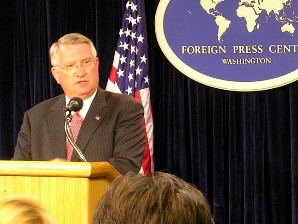
too much ''happy talk'' from John Walters
The reports, by George Mason University senior fellow Jon Gettman, are available
here. They examine official government data from the annual National Household Survey on Drugs and Health and the Treatment Episode Data Set.
Based on the government's own numbers, ONDCP has failed to achieve its stated 2002 goal of reducing marijuana use by 25% by 2007, Gettman found. According to the national survey, last year there were 14.5 million pot smokers, compared with 14.6 million in 2002. From 2002 to 2007 annual use of marijuana declined slightly from 25.9 to 25.1 million. The number of Americans who have used marijuana at some point in their lives actually increased, from 95 million in 2002 to over 100 million in 2007.
Similarly, teenage marijuana use -- the reduction of which is one of ONDCP's stated goals -- remains high. More than one in nine (12%) of 14- and 15-year olds and one in four (23.7%) 16- and 17-year-olds used marijuana in 2007. But disturbingly, there were 472,000 12- and 13-year-olds and 627,000 14- and 15-year-olds who did not use marijuana in 2006 but still used illegal drugs. Nearly half of them used inhalants and illegally obtained pain relief drugs.
More broadly, there were 35.7 million annual illicit drug users in the United States in 2007, 14.4% of the population. Of all illicit drug users, 41% used only marijuana. Another 29% used marijuana and at least one other illicit drug, while 30% used other illicit drugs, but not marijuana.
"The Bush Administration has failed to reduce or control marijuana use in the United States," Gettman concluded. "Marginal changes in marijuana and other drug use have been distorted to support false claims that incremental progress in reducing marijuana and other drug use has been achieved. Marijuana use is fundamentally the same as when the Bush Administration took office and illicit drug use overall has increased. Drug use data do not support Bush Administration claims that its policies have had a significant impact on illicit drug use in the United States."
The stability -- not reduction -- in marijuana use comes despite at least 127 different anti-marijuana TV, radio, and print ads by ONDCP, in addition to at least 34 press releases focused mainly on marijuana and at least 50 reports from ONDCP or other government agencies on marijuana or anti-marijuana campaigns.
For ONDCP head John Walters, slight reductions in teen marijuana use meant that "teens are getting the message about the harms of marijuana and are changing their behavior -- for the better", as he noted in a September 2007 press release. Still, he was forced to admit in the next breath that "youth abuse of prescription drugs remains a troubling concern."
Similarly, in a July press release, Walters called for an "intervention" against adult marijuana use, and tried to define the pot experience as he did so. "Marijuana is the blindspot of drug policy," said Walters. "Baby Boomers have this perception that marijuana is about fun and freedom. It isn't. It's about dependency, disease, and dysfunction. As the data released today reveal, marijuana is a much bigger part of our Nation's addiction problem than most people realize. While teen marijuana use is down sharply [sic], adult use, with all the social, economic, and health consequences that go along with it, will not improve until we start being more honest with ourselves about the seriousness of this drug. Too many of us are in denial, and it is time for an intervention."
"The government's own statistics demolish the White House drug czar's claims of success in his obsessive war on marijuana," said Rob Kampia, executive director of the Marijuana Policy Project (MPP) in Washington, DC. "The most intense war on marijuana since 'Reefer Madness,' including record numbers of arrests every year since 2003, has wasted billions of dollars and produced nothing except pain and ruined lives."
If ONDCP has failed to reduce marijuana use, it has been quite successful in driving up the number of people forced into drug treatment for marijuana use. The problem is that many of the people seeking treatment for "marijuana dependency" aren't dependent and don't need treatment. The percentage of admissions in which marijuana was the primary substance of abuse referred by the criminal justice system increased from 48% in 1992 to 58% in 2006. But less than half (45%) of admissions met the criteria for dependence established by the Diagnostic and Statistical Manual of the American Psychological Association.
"Increases in drug treatment admissions for marijuana, often cited by officials as evidence that marijuana is dangerously addictive, are driven by criminal justice policies rather than medical diagnosis," Gettman noted. "These policies increase public costs for providing drug treatment services and reduce funds for and availability of treatment of more serious drug problems."
Your tax dollars are paying for unnecessary drug treatment for marijuana users. Government programs will pay for drug treatment in 62% of admissions where marijuana is the primary drug of abuse, and 60% of marijuana treatment admissions referred by the criminal justice system.
"In thousands of cases, taxpayers appear to be funding treatment for non-addicts whose only problem is that they got caught with marijuana," said Gettman.
Based on the official data, Gettman also found that ONDCP had demonstrably failed to meet its 2002 two-year goal of a 10% reduction in drug use by teens and by adults or its five-year goal of a 25% reduction in drug use among those two groups. Teen drug use did decline, but by less than ONDCP goals. There was a 7% population reduction in current illegal drug use from 2002 to 2004, and a 16% reduction from 2002 to 2007. But among adults, while the population of current illegal drug users fell 1.5% from 2002 to 2004, it actually increased 4.8% from 2002 to 2007. That increase in adult use of illicit drugs was due to the use of opioid pain relievers, according to the national use survey.
And so goes the war on America's most popular illicit drug. While the drug czar rails against pot, the kids and the adults are turning to pain pills. That's progress?
back to top
Dear friend and reformer,
In our current
TRUTH 08 Campaign, we have featured the important and unique new book
Dying to Get High: Marijuana as Medicine, by sociologists Wendy Chapkis and Richard Webb. More than 1,300 people have read our review of the book by Drug Chronicle editor Phil Smith -- check it out
here!
Please donate to the TRUTH 08 Campaign to support StoptheDrugWar.org's work providing this and other critical writing reaching hundreds of thousands of people every month. Donate $36 or more and you can receive a complimentary copy of Dying to Get High as our thanks.
|
book:
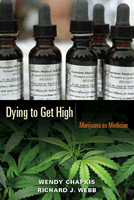
notepad folder:
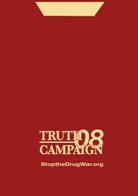 |
Donate $60 or more, and we'll send you both
Dying to Get High AND the new TRUTH 08 Campaign padded notepad folder with clasp. Or just select the notepad folder as your gift selection with a donation of $36 or over. (Use our
regular donation page to browse the many other books and gift items that we continue to make available.)
Following are a few things that Chronicle editor Phil Smith had to say about the book Dying to Get High: Marijuana as Medicine, in his recent widely-read review:
In "Dying to Get High," sociologists Wendy Chapkis and Richard Webb... trace the use of marijuana as medicine in the US... its removal from the pharmacopeia in 1941... the continuing blockage of research into its medical benefits by ideologically-driven federal authorities.
Chapkis and Webb deliver a resounding, well-reasoned indictment of the political and (pseudo) scientific opposition to medical marijuana.
"Dying to Get High" is also an in-depth portrait of one of the country's most well-known medical marijuana collectives... describing in loving detail the inner workings... of a group with charismatic leadership... more than 200 seriously ill patients, and the specter of the DEA always looming.
Your help is needed right now to capitalize on the tremendous progress we've already made getting the TRUTH out: the past 12 months nearly
150,000 people per month visited StoptheDrugWar.org. Several months the number of visitors topped 180,000 and the trend is continuing upward.
I am very excited about the new momentum we're generating together, and I'd like to thank you very much for your interest in changing this country's drug policies and for giving your support to the TRUTH 08 CAMPAIGN. Your contribution has never been more important.

David Borden
Executive Director, StoptheDrugWar.org (DRCNet)
News & Activism Promoting Sensible Reform
P.S. It's time to stop the senseless tragedy of the drug war and to bring an end to the countless injustices occurring every day. Your donation to the TRUTH 08 CAMPAIGN today will help spread the word to more people than ever and build the momentum we need for change. Thank you!
back to top
A Wyoming cop get sentenced for stealing his canine officer father's training dope, a prosecutor in Indiana is in the hot seat over asset forfeiture, and another prison guard gets busted. Let's get to it:
In Tallahassee, Florida, a state prison guard was arrested Monday night for allegedly selling cocaine at a North Florida prison. Florida Department of Corrections guard Keith Alan Black is charged with one count of trafficking cocaine. He was arrested after an investigation that began September 24 and was being held in the Leon County Jail on a $150,000 bond.
In Lyman, Wyoming, a former Gillette police officer and Campbell County jail guard was sentenced October 1 to two to four years in prison for stealing marijuana from his father's police patrol car. Thomas Brent Clark took about one pound of pot that his father, a canine officer for the Uinta County Sheriff's Department, kept in his vehicle for training purposes. He was sentenced to the same amount of prison time last week in Campbell County, but may not actually serve any time behind bars. His sentencing judge has recommended that he be sent to a six-month boot camp rather than the state penitentiary.
In Delaware County, Indiana, asset forfeiture abuses by local prosecutors continue to roil local courts. Circuit court judges have been reviewing old cases and are especially critical of County Prosecutor Mark McKinney, whom one judge labeled "deceitful" in his dealing with the court on drug forfeitures. Judges also rebuked McKinney for using confidential settlement agreements with defendants to obtain property without going through the courts, and one judge is examining past forfeiture cases in his court after learning that a defendant's bank account he had ordered frozen had been emptied. That's part of a pattern with McKinney, who in this case divided the bank account holdings between the Muncie Delaware Drug Task Force, the defendant, and his defense attorney. McKinney must now file a brief explaining why he should not be held personally accountable for the improperly distributed funds.
back to top
A bill that would add salvia divinorum to the Bay State's list of controlled substances has passed out of the Massachusetts House of Representatives. HB 4434 passed the House on September 29 and now heads for the state Senate.
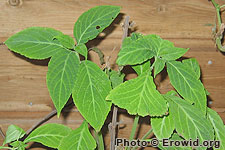
salvia leaves
Supporters of the ban, led by Rep. Viriato Manuel deMacedo (R-Plymouth), who cosponsored the bill, said salvia is a dangerous, mild-altering drug. They cited the infamous Youtube videos of young people under the influence of the plant, as well as recent national survey data suggesting that use is on the rise.
Salvia has no known toxic level and produces a fast-acting, short-lived high. It has been used in traditional shamanism in Mexico, where it originated, for hundreds, if not thousands, of years. According to the Salvia Divinorum Research and Information Center, the herb has been used in divination, healing, meditation, and for exploration of consciousness.
If the Massachusetts salvia ban passes into law, Massachusetts would become at least the ninth state to outlaw the herb. Another handful of states have restricted its sales without an outright ban.
The Massachusetts bill also includes a provision adding blunt wrapping papers and glass rose pipes to the state's list of items deemed drug paraphernalia.
back to top
Ending a contentious, year-long argument over what constitutes a 60-day supply of medical marijuana, the Washington state Department of Health last week issued new regulations setting the limit at 24 ounces of smokeable marijuana and 15 plants, no matter what size. The new standard comes a decade after Washington voters okayed the use of medical marijuana in 1998.
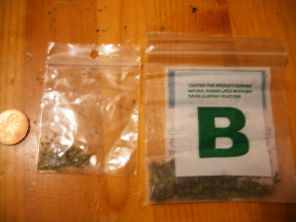
California medical marijuana bags (courtesy Daniel Argo via Wikimedia)
While the 1998 law specified that patients could have a 60-day supply, the law never specified just what that meant. As a result, some patients ended up being arrested and tried by prosecutors unfriendly to the law or intent on making sure it was not being used as a cover for marijuana manufacture and distribution. Some patients have even been
convicted despite having physician recommendations.
Last year, the state legislature voted to order the Health Department to come up with reasonable quantities. After consulting with law enforcement, patients, medical personnel, and others, the department came up with a draft proposal calling for 24 ounces, six mature plants, and 18 seedlings, but that was lambasted by patients and advocates at an August hearing as insufficient for some patients.
The only differences between the draft and the final regulations were the move to allow 15 plants regardless of maturity, a move the department said would result in patients being able to harvest more, and the dropping of the requirement that patients get a doctor's note if they need more than the 60-day supply set by the department.
"We took a lot of public comment, listened to what people told us, and then made several changes after considering those comments," said Secretary of Health Mary Selecky. "The final rule is simpler and gives patients and caregivers more flexibility in growing plants. Many patients said they didn't like the distinction in the draft rule between mature and immature plants. We believe the patients and their caregivers are in the best position to decide that."
Although not everyone in the Washington medical marijuana community is pleased with the new quantity regulations, they are in line with those of neighboring Oregon and exceed those of some California counties.
back to top
It has been a long, hot summer in Cincinnati, with the Ohio River city on a pace to equal or top the record-setting 86 murders committed in 2006. Local officials there are blaming drugs -- or the lack of them -- for the violence -- which is just a step away from acknowledging the role of drug prohibition in violent crime, but don't expect them to take that last step.

Mayor's anti-violence graphic, Cincinnati
In the last week of September, there were five murders, increasing this year's toll to 58, three more than at the same time last year. It's because of a shortage of cocaine, said Cincinnati police.
"Our intelligence says there is quite a shortage of crack cocaine right now, and that has the buyers frantic to buy based on their addiction and the sellers know their livelihood is threatened based on supply and demand," said Lt. Col. James Whalen, Cincinnati's patrol bureau commander. "When you get involved with buying and selling drugs, unfortunately you run into violence," he told the Cincinati Enquirer.
Hamilton County Municipal Judge Melissa Powers said drugs are playing a part in the violence, but it has to do with competition rather than supply. "It's very difficult. Once you arrest one drug dealer, another one takes his place," she said. "I think that's what we're seeing now, the rooting out among drug dealers."
Cincinnati Mayor Mark Mallory and City Manager Milton Dohoney last week issued a joint statement calling for an end to prohibition-related violence, although they called it drug-related violence. "None of the shootings were random, which underscores the importance of staying out of illegal activities," the statement from Mallory and Dohoney said. "If you are involved in drug activity, whether as a buyer or a seller, you put yourself at a very high risk of becoming a victim of violence."
While Cincinnati's law enforcement and political establishment has clearly focused on a problem -- prohibition-related violence -- it has yet to properly identify it. By displacing that cause onto "drugs," the city will not solve its violence problem, but only exacerbate it.
back to top
Relations between Bolivia and the US, already strained by Bolivia's expulsion of the US ambassador last month for allegedly helping to instigate anti-government protests and the subsequent US "decertification" of Bolivia for failure to comply with US drug war aims, grew even colder over the weekend. Last Thursday, Bolivian President Evo Morales rejected a DEA request to overfly the country, and on Saturday, he launched a rhetorical attack on US anti-drug policy.
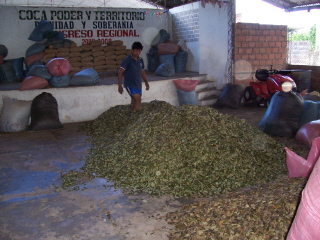
Bolivian coca leaves drying in warehouse -- the sign reads ''Coca Power and Territory, Dignity and Sovereignty, Regional Congress 2006-08'' (photo by Phil Smith, Drug War Chronicle)
According to the
Bolivian Information Agency, Morales last Thursday instructed his government to deny a written request from the US government to conduct surveillance flights over the South American nation. "Two days ago I received a letter from the US DEA asking a government institution for permission to fly over national territory," the agency quoted Morales as saying. "I want to say publicly to our authorities: They are not authorized to give permission so that the DEA can fly over Bolivian territory."
Bolivia is the world's third largest producer of coca, from which cocaine is produced. Since his election as president, Morales, who rose to prominence as a coca grower union leader, has embarked on a policy of "zero cocaine, but not zero coca." Under the Morales government, peasants are allowed to grow specified amounts of coca for traditional and industrial uses. In another sign of tension with the US, coca farmers loyal to Morales recently expelled US AID from the Chapare coca-growing region, saying its programs were ineffective.
On Saturday, Morales stepped up the rhetoric, saying Bolivia does not need US help to control its coca crop. He spoke before a crowd of coca growers outside La Paz.
"It's important that the international community knows that here, we don't need control of the United States on coca cultivation. We can control ourselves internally. We don't need any spying from anybody," Morales said in remarks reported by the Associated Press.
A State Department spokesman told the AP that the US had decertified Bolivia in part because it had chosen to follow its own path instead of Washington's lead. "We've certified Bolivia twice before under the Morales government, even though they have taken a very different approach to counter drugs, especially to eradication, than previous governments," said Thomas Shannon, the top US diplomat for Latin America. "But what we've noticed over the past couple of months," he added, "was a declining political willingness to cooperate, and then a very precise attempt by the part of some of the government ministries to begin to lower the level of cooperation and try to break the linkages" between US and Bolivian anti-drug efforts.
Although the Bush administration decertified Bolivia, it did not cut off anti-drug aid. It did, however, suspend Bolivia's exemption from US tariffs under a regional trade agreement. That could cost Bolivia up to 20,000 jobs, according to Bolivian business leaders. [Ed: What kind of jobs do people turn to sometimes when they lose their legal jobs?]
back to top
Impelled by profits from the coca trade and crackdowns in other parts of the country, coca farmers in Peru's south-central Apurimac and Ene River Valleys (VRAE) region are pushing into indigenous lands in the country's Amazon jungle, according to a new report from the Inter Press Service news agency. The occupants of those territories are not pleased.
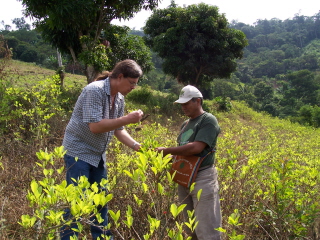
Chronicle editor Phil Smith with VRAE cocalero leader Abdón Flores Huamán
Peru is the number two world coca producer behind Colombia and produced some 56,000 tons of coca leaves and about 180 tons of cocaine, according to the UN Office on Drugs and Crime. Just under half of all Peruvian coca cultivation occurs in the VRAE, where there are some 30,000 farmers who are coca union members. Only about 10,000 of those are registered with ENACO, the Peruvian state coca monopoly that buys licit coca crops.
Although Peruvian authorities are undertaking crop eradication efforts in other parts of the country, such as the Huallaga Valley, such efforts are on hold in the VRAE, where authorities fear igniting the fuse on an explosive mixture of poverty, anti-government sentiment, drug gangs, and remnants of the Shining Path who have devolved into drug traffickers or protectors of traffickers.
The commissioner for peace and development in the central jungle region, Mario Jerà Kuriyama, told IPS that indigenous Asháninka people in the area have complained repeatedly about the incursions by would-be coca-growers. In mid-July, Asháninka communities along the Ene River agreed to oppose encroachments by outsiders and protect their territories.
"Many small farmers have come into the central jungle region in the last few years to plant coca because of the higher profit margins it offers. But local indigenous people are opposed to their arrival, as they don't want strangers on their land," said Jerà Kuriyama.
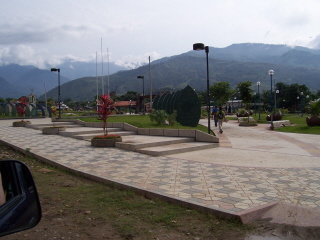
statues of coca leaves, Municipal Park, Pichari (photo by Phil Smith, Drug War Chronicle)
"The Asháninka people are opposed to the settlers, especially because they see them as having links to Sendero Luminoso, which killed their family members during the (1980-2000) armed conflict, and also because they associate them with drug traffickers. For them, these people will always be 'invaders'," anthropologist Ãscar Espinosa, from Peru's Catholic University, told IPS.
One Asháninka community on the Ene, Shimpenshariato, has been particularly hard-hit, CARE technician Kilderd Rojas told IPS. After an all-day trek by automobile and boat to the remote village, Rojas reported large coca plantations near houses equipped with satellite dishes and other luxuries. "At least half of the community's land has been invaded, and of that proportion, 30 percent is planted in coca and the rest in other crops," Rojas said.
The coca growers' move into the indigenous lands is a predictable result of attempts to crackdown on coca growing and drug production in the region, said drugs and development expert Ricardo Soberón. "While the authorities celebrate their 'victories' against coca and drug production in other valleys, like the Huallaga valley, they are not noticing how the pendulum is swinging towards the central jungle, where the drug trafficking routes, armed terrorist groups, new areas of coca cultivation -- a series of factors that expose local indigenous people to the interests of the drug mafias -- are now concentrated," Soberón told IPS.
back to top
Twice in the past two weeks, courts in Malaysia have condemned people to death for marijuana trafficking offenses. Meanwhile, both Iran and Yemen have executed drug offenders in the past three weeks. Except where otherwise linked, information in this article comes from the global anti-death penalty group Hands Off Cain.
In Malaysia, the High Court Wednesday handed down death sentences to two men, Kairil Anuar Abdul Rahman, 34, and Afendi Adam, 28, for trafficking a little under two pounds of pot six years ago. The pair, a restaurant worker and a painter, respectively, were arrested in March 2002 for selling 971 grams of marijuana. Judicial Commissioner Ridwan Ibrahim said the court had no choice but to impose the death sentences after the men were found guilty. Attorneys for the pair are expected to appeal both the convictions and the sentences.
Two weeks earlier, the Shah Alam Higher Court imposed the death sentence on an Indonesian immigrant, Junaidi Nurdin, 32, for selling 979 grams of pot. Junaidi was arrested in April 2004 after he sold the stuff to an undercover policeman at a restaurant in Shah Alam. He, too, is expected to appeal.
Meanwhile, the execution of drug offenders continued apace in the Middle East. In Yemen, convicted Pakistani drug trafficker Birkhan Afridibar Hussein, 50, was executed at the Central Prison in Sanaa on September 17 after his death sentence was approved by the president of the republic. And in Iran, a man known only as Taher H. was hanged Tuesday in the northern city of Hamedan. Taher H. had been imprisoned on drug charges there, but escaped, only to be caught again with 530 pounds of heroin.
The executions of nonviolent drug offenders, almost exclusively in Southeast Asia and the Middle East, have added momentum to calls for a global moratorium on the death penalty and particularly against using the death penalty for drug offenses.
back to top
More than half of Dutch judges surveyed by the newsweekly Vrij Nederland think marijuana should be legalized, according to a report from the Netherlands Information Service. The weekly interviewed 489 judges, 22 apprentice judges, and 140 prosecutors.
More than half (52%) said "soft drugs," such as marijuana or hashish (and possibly psychedelics) should be legalized. More than one in ten (12%) said even the use, possession, or dealing of "hard drugs," such as cocaine, heroin, or methamphetamine, should not be criminally prosecuted.
Although marijuana sales are regulated and taxed in the Netherlands' famous coffee shops under Dutch "pragmatism" policies, the sale or manufacture of marijuana officially remains a crime under Dutch law. The current conservative Dutch national government has attempted to shut down the coffee shops, but without popular support for such a move has had to settle for tightening regulations on the marijuana outlets and gradually reducing their numbers.
The Dutch judges are apparently a fairly liberal bunch. According to the survey, in addition to supporting anti-prohibitionist drug policies, nearly half (48%) thought anti-terrorism measures had gone too far, 41% were concerned about the privacy of citizens, and 10% believe that the Netherlands is on the path to becoming a police state.
back to top
For decades law enforcement agencies including local police, DEA and US Customs have used what is known as "presumptive field drug-test" kits to confirm that suspected materials are illegal drugs. The tests, which use powerful acids to react with suspected substances, change color to indicate the presence or absence of drugs. However, there is now conclusive evidence the field drug tests falsely indicate the presence of drugs when used on numerous natural products such as soap, soy milk, essential oils and chocolate. Developed over 60 years ago, these tests are made by the giant homeland security company Armor Holdings, a subsidiary of BAE Systems. At a cost of less than five dollars each, the field drug tests can be found in nearly every police car, border checkpoint, jail and in most schools.

NarcoPouch Squad Pack Kit, the Armor Holdings product responsible for the Don Bolles false positive
In August and September of this year, Canadians Ron Obadia and Nadine Artemis, founders of Living Libations who make raw organic chocolate and natural personal care products, were arrested while trying to cross the US border, after a false-positive drug test on their chocolate products. Their eight month old son was taken from them, and US border agents interrogated them separately and attempted to coerce confessions, even telling them their partner had confessed to smuggling hash. The couple eventually was cleared of all drug charges from the August incident after confirmation lab tests showed there were no drugs. But they were re-arrested in September while again trying to cross the US border for a US natural products trade show, despite high level communication and permission between their Canadian attorney and US Customs officials. Mr. Obadia now faces charges of exporting a controlled substance, where the only evidence is an NIK (Armor Holdings brand) field test for marijuana that was administered by Customs officials that falsely indicated that their raw organic chocolate in their hand luggage was hash. Mr. Obadia's attorney Mark Mahoney intends to subpoena Armor Holdings for all internal records and documents regarding false-positives, and a complete account of the incidents is on their
web site.
Similar false positives have resulted in arrests over other natural products. In 2007, a false-positive for the date rape drug GHB occurred when Newport Beach (CA) police tested Dr. Bronner's peppermint soap. Based on the faulty field test, well-known musician Don Bolles was jailed for three and half days over Easter weekend. After the Bronner family helped post bail and hired an attorney, the charges were dropped when more accurate crime lab tests showed there was no GHB in their soap. Further investigation by Dr. Bronner's found that any natural soap, including brands such as Tom's of Maine and Neutrogena, will falsely test-positive for GHB using the field drug test. Dr. Bronner's is also covering Mr. Obadia and Ms. Artemis's attorney costs going forward.
"We are alarmed by the growing number of people who have been taken to jail for simply possessing organic products," says Ronnie Cummins, Executive Director of the Organic Consumers Association (OCA). "This is an attack on people who have adopted an organic natural lifestyle, whether it's the food they eat, the soap they clean with or the perfumes they use. What kind of world do we live in where nursing mothers' have their babies taken from them and are subjected to coercive interrogations to generate false confessions, over healthy organic foods like raw chocolate," says Cummins, who cofounded the 800,000 supporter strong OCA. The American Civil Liberties Union's Drug Law Reform Project is also contemplating a class action challenge to the drug war testing industry.
back to top
October 14, 1970: President Nixon spearheads the Controlled Substances Act (CSA), legislation establishing today's "schedules" as a means of classifying drugs strictly by their medical value and potential for abuse.
October 12, 1984: The Comprehensive Crime Control Act becomes law, establishing federal "mandatory minimum" sentencing guidelines eliminating judges' discretion when handing down prison terms. Over the next two years drug sentences increase by 71% nationwide.
October 15, 1986: Assistant Attorney General Mark Richard testifies before the Kerry Committee that he had attended a meeting with 20 to 25 officials and that the DEA did not want to provide any of the information the committee had requested on the involvement of US-backed Nicaraguan Contra rebels in drug trafficking.
October 13, 1999: In a series of raids named "Operation Millennium," law enforcement in Mexico, Colombia, and Ecuador arrest 31 persons for drug trafficking, including Colombian cartel leader Fabio Ochoa. Ochoa is indicted in a Ft. Lauderdale court for importing cocaine into the US, which requests his extradition in December 1999.
October 13, 1999: Governor of New Mexico Gary Johnson is quoted by the Boston Globe: "Make drugs a controlled substance like alcohol. Legalize it, control it, regulate it, tax it. If you legalize it, we might actually have a healthier society."
October 10, 2002: Drug Czar John Walters travels to Las Vegas, Nevada and begins two days of making appearances around the state illegally lobbying against Question 9, a proposal to amend the state constitution by making the possession of three ounces or less of marijuana legal for adults. The measure is defeated at the polls the following month.
October 14, 2003: Supreme Court justices reject the Clinton administration's request, continued by the Bush administration, to consider whether the federal government can punish doctors for recommending or even discussing the use of marijuana for their patients. The decision by the High Court clears the way for state laws allowing ill patients to smoke marijuana if a doctor recommends it.
October 14, 2003: At Emory University Law School former President Jimmy Carter says, "All three of my boys smoked pot. I knew it. But I also knew if one was caught he would never go to prison. But if any of my [black] neighbors got caught, they would go to prison for ten, twelve years. No law school has had the temerity to look at what is fundamentally wrong with our legal system, which discriminates against the poor."
back to top












